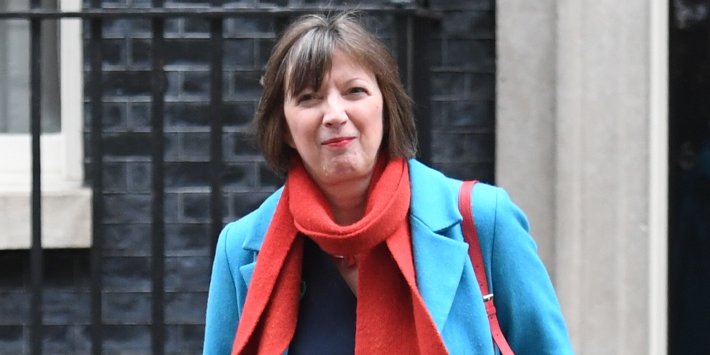Government warned bosses could make ‘unreasonable’ demands as one in three shielding people ‘not at all’ comfortable returning to work
The Government’s programme for clinically extremely vulnerable people came to an end on August 1.
5 min read
One in three people covered by the Government’s now-paused coronavirus shielding programme say they are “not at all comfortable” heading back in to their place of work, official figures show.
Charity Scope warned of a “disability employment crisis” as the latest Office for National Statistics data revealed reluctance about returning to work among many of those deemed more vulnerable to the virus.
And trade union chief Frances O’Grady told PoliticsHome bosses must not give “unreasonable ultimatums to vulnerable workers” to make them do so.
More than two million people were identified as being clinically “extremely vulnerable” to a severe impact from Covid-19, and were advised to entirely avoid contact with others until July, before restrictions on household contact were loosened.
The Government shielding programme, which covered people in high-risk categories such as organ transplant patients and those undergoing chemotherapy, came to an end on August 1, and those who were covered are now advised they “can go to work as long as the workplace is Covid-secure”.
But it says they “should carry on working from home wherever possible”.
The ONS data reveals the impact lockdown has had on the employment status of people who were in shielding.
While 623,000 clinically extremely vulnerable people were working before the shielding guidance came into force, over half (52%) of those “had either stopped working, been furloughed or were on the Self-Employment Income Support scheme”, the ONS data shows.

Just 11% carried on working outside the home while 37% worked from home during the time the guidance was in force.
One-third of those in shielding who normally work said they were still “not at all comfortable with working outside the home” — while just 24% said they were “completely comfortable” doing so.
Six percent of those who normally worked are not planning to return to work at all in the next four months.
However, forty-four percent told the ONS they would be comfortable going back to work if either they or their employer could put protective measures in place.
'IMPOSSIBLE CHOICE'
Ms O’Grady, who heads up trade union group the TUC, told PoliticsHome the figures showed why the Government’s furlough scheme should continue beyond its October end-date for people covered by the shielding scheme.
The TUC general secretary (pictured) said: “It's no surprise that shielding workers are feeling nervous about returning to work - especially given the recent spike in infections.
“We all want to get people back to their workplaces, but this must be done in a safe and phased way.
“The Government must make clear to employers that they cannot give unreasonable ultimatums to vulnerable workers to return to workplaces.
“The job retention scheme is in place until at least October, so employers must continue using it if home working is not an option.
"And the Government should make clear that furlough will still be an option after October for shielding workers who cannot safely travel to workplaces or who may be subject to a local lockdown.”

That call for more support was echoed by Labour, with shadow disability minister Vicky Foxcroft saying: “Sadly these statistics confirm what Labour has been warning for some time, issuing back to work notices for the clinical vulnerable with no support has left many facing an impossible choice between their health and their livelihood.”
She added: “The Government must publish the scientific advice it has received confirming it is safe for disabled and clinically vulnerable people to stop shielding.
“They must urgently confirm how those who cannot return to their workplace will be supported, how many people this affects and what steps they are taking to communicate this to the shielding community."
And Liberal Democrat leadership hopeful Layla Moran warned: “Those who do not yet feel able to return to work should be entitled to Statutory Sick Pay.
“Employers must also show flexibility to those who are shielding and want to work from home.
"We cannot have a situation where people are forced to risk their own lives just to make ends meet.”
'FORCED TO RETURN'
Disability charity Scope meanwhile warned that disabled people could be put in an "impossible situation" as they decide on whether to prioritise their health or their income.
James Taylor, the group’s executive director of strategy, impact and social change said the ONS data showed that there was “a disability employment crisis waiting to happen, as huge numbers of people at higher risk from the virus remain unconvinced about the safety of returning to work”.
“While some of those clinically most at-risk say they feel comfortable returning to their workplace if protective measures are in place, we’re concerned many people could be forced to return to work without adequate arrangements in place,” the charity said.
“Changing guidance so returning to the workplace is at employers’ discretion could put many disabled people in an impossible position, stuck between protecting their health and paying the bills.
“Scope’s own research found only 5 per cent of disabled people feel safe about shielding changes. Shielding has paused, yet disabled people’s anxiety about coronavirus has no pause button.”
The end of the shielding programme also means that clinically extremely vulnerable people will no longer be entitled to free food parcels, medicine deliveries and basic care from the government-run National Shielding Service.
The Government is instead signposting them to voluntary organisations.
It says: “You could be advised to shield again if the situation changes and there is an increase in the transmission of COVID-19 in the community.
“Your name will be kept securely on the shielded patient list by NHS Digital. We will write to you if the advice changes. Any national changes will be reflected in this guidance.”
